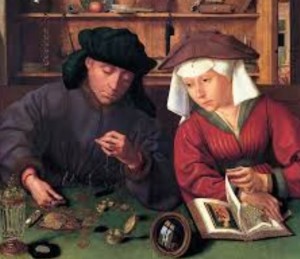 Scrooge was a very wealthy man but very miserable. If you look up the word “miser” in the dictionary and if they put pictures beside entries, I’m sure we’d see his picture there. Solomon ended his dissertation on the negative impact that the love of money can bring to our lives, but then in the next couple verses he brings God back into the picture. Look at this, “Behold, what I have seen to be good and fitting is to eat and drink and find enjoyment in all the toil with which one toils under the sun the few days of his life that God has given him, for this is his lot. Everyone also to whom God has given wealth and possessions and power to enjoy them, and to accept his lot and rejoice in his toil—this is the gift of God.” (Ecclesiastes 5:18–19)
Scrooge was a very wealthy man but very miserable. If you look up the word “miser” in the dictionary and if they put pictures beside entries, I’m sure we’d see his picture there. Solomon ended his dissertation on the negative impact that the love of money can bring to our lives, but then in the next couple verses he brings God back into the picture. Look at this, “Behold, what I have seen to be good and fitting is to eat and drink and find enjoyment in all the toil with which one toils under the sun the few days of his life that God has given him, for this is his lot. Everyone also to whom God has given wealth and possessions and power to enjoy them, and to accept his lot and rejoice in his toil—this is the gift of God.” (Ecclesiastes 5:18–19)
Life is good. It is good for both rich and poor alike. If we focus on the giver of the great gift of life we find a God-centered joy that transcends all the rewards associated with wealth, power, and pleasure. Ryken summarizes by saying Solomon “knows that joy is real because he has experienced it himself. He also knows that joy is …something appropriate for the people of God. Yes, our time on earth is short, but whatever time we do have is a sacred gift. When the Preacher calls life ‘the gift of God,’ he is giving it the highest praise. This is not stoicism or sarcasm but godly gratitude. The Preacher can say this because he believes in the God of joy.” Actually, without God life under the sun is meaningless and miserable. Finding true joy with Him is trying to catch the wind; vanity of vanities. We should look for true joy only in and through a personal relationship with the God, the giver of all the good gifts of life.
Jesus came to reestablish our broken relationship with God. Quentin Massys was a Flemish painter during the reformation. In one painting from the 1500’s he portrays a woman watching a man count his money. The title of this painting is “The Money Lender and His Wife.” In this masterpiece the wife has what appears to be the Bible open in front of her. But her attention has been drawn away from it to focus on the money her husband was counting. According to Phil Ryken, when people have looked at this painting in a mirror they see the “dark lines of a window frame intersecting to make the form of a cross. We also see a small figure reaching out for the frame, as if to hold on to the cross. The face is familiar to art historians: it is Massys himself.” Many art critics have recognized the intended message. Ryken interprets it for us. He writes, “Massys is reminding us not to look for money to give us any satisfaction in life. Instead we are invited to reach out for the cross where Jesus gave his life for all our greedy sins, to Jesus and to find our full satisfaction in Him.”